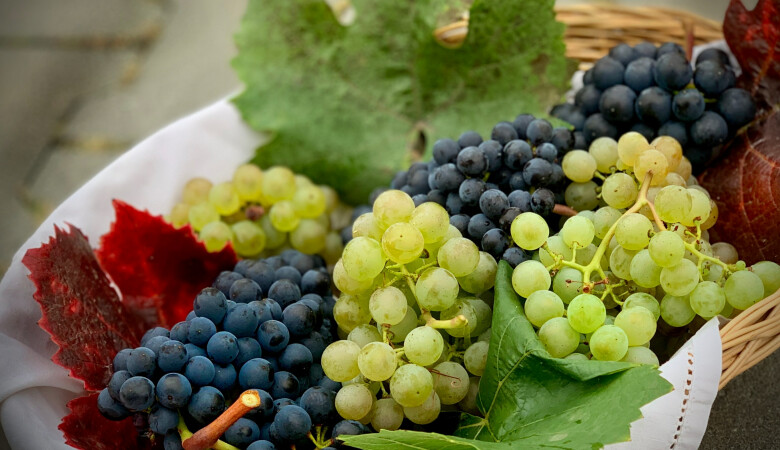The Acts of the Flesh vs. the Fruit of the Spirit (Galatians Sermon 22 of 26)
June 01, 2014 | Andy Davis
Galatians 5:22-26
Life in the Spirit, Fruit of the Spirit
Pastor Andy Davis preaches on Galatians 5:22-26 and how we can distinguish between sinful acts of the flesh and holy acts of the Spirit.
- SERMON TRANSCRIPT -
Some time ago, my family and I had the opportunity to go to Monticello which is Thomas Jefferson's home, it's up on a small mountain in Central Virginia. And we had the chance to walk through the amazing grounds there, the gardens that are there. And he was many things, of course: A politician, a philosopher, inventor, but I think he would say above all things he was a farmer, and I would say, a scientist farmer. And he liked to study how things grew in the soil there on top of that mountain in Monticello. And if you walk through the ground, some other grounds keepers have come in the spirit of that same desire to have the most lavish display of flowers, and fruits and vegetables, and trees you could have. Only thing that could be improved is if it will all be done to the glory of God. Amen? Out of faith in Jesus Christ.
But I was there in that spirit, and I was so delighted to see these flowers and just to smell the fragrant air of all of these flowering things, to see the rare wildflowers, and to smell the roses, and to see the tulips, and to see all of that. I was especially mindful of the fact (speaking just for myself, not for my wife), that I can't grow anything. I tend to kill things. I don't mean to, but we have no green thumb. I guess, we have a brown thumb. I don't know, maybe that's the opposite of a green thumb. But he apparently was just exceptionally skillful at growing things, and then fruits, incredible fruits, 150 different varieties of 31 temperate species of fruits. All different kinds of things: Plums, and pears, and grapes, and apricots, and Spanish almonds, and all of it there for the picking. And then vegetables, amazing vegetables; 250 varieties of more than 70 different species of vegetables. And he studied how they would flourish, and what they were, and what different combinations of fertilizers, and watering and all of that.
What Kind of Fruit is on Display in Your Life?
Monticello is a rich treasure of growing things, but it made me think about my soul and the passage that we're looking at today, the Fruit of the Spirit. What kind of fruit is there in my life? If you could take a walk through my life as we go through that kind of circuitous path there at Monticello and you look around. If you were to do that in my life, what would you see? What is the fruit of your Christianity? What is going on in your life? In John chapter 15, Jesus used an agricultural analogy saying, "I am the true vine and my father is the gardener. He cuts off every branch of me that bears no fruit, while every branch that does bear fruit, he prunes so that it will be even more fruitful." And then he said, "Abide [or dwell or remain, live] in me and I will remain in you. No branch can bear fruit by itself; it must remain in the vine. And neither can you bear fruit unless you abide in me. [said Jesus] "I am the vine, you were the branches. If someone remains in me and I in him, he will bear much fruit. For apart from me, you can do nothing."
Jesus taught the same thing in The Sermon on the Mount. He said that we will most certainly in him bear fruit, and the kind of fruit we bear shows who we are and what we are like. He said in the Sermon on the Mountain, (Matthew 7:16-20)"By their fruit you will recognize them. Every good tree bears good fruit but a bad tree bears bad fruit. A good tree cannot bear bad fruit and a bad tree cannot bear good fruit. Every tree that does not bear good fruit is cut down and thrown into the fire thus by their fruit, you will recognize them." And many such passages, as well. I ask you this, I'm asking myself, what kind of fruit is there in your life?
Now, the problem for us is that the answer must be inconsistent. There is, in every Christian, good fruit but also bad fruit. James talks about this in James 3:9-12. He says, "With the tongue we praise our Lord and Father, and with it, we curse men who have been made in his likeness. Out of the same mouth come praise and cursing. My brothers this should not be. Can both fresh water and salt water flow from the same spring? My brothers, can a fig tree bear olives or a grape vine bear figs? Neither can a salt spring produce fresh water." And yet we acknowledge, as divided beings, as those who struggle with the flesh, but we are also indwelt by the Spirit that we see out of the same life come both things that we give glory to God for in praise and for in those things that we are ashamed of and wish we would never do.
Now in Galatians 5, we see a very clear description of this whole problem, the war between the flesh and the Spirit that goes on inside each one of us. Galatians 5 gives a lengthy list of the works of the flesh and contrasts it with the fruit of the Spirit. The ongoing work of the indwelling Holy Spirit of Christ is to conform us from the inside out to Jesus Christ, so that we would actually be like Christ in every respect. The Fruit of the Spirit that I'm going to look at today is one of the most famous passages in the New Testament. In the book of Galatians, it is the goal of sanctification. It is what God is working in us. It is the goal of the Spirit-filled life at every moment. I believe the Fruit of the Spirit is a good checklist for yourself at every moment. Just take a snapshot of yourself at any moment throughout this upcoming week. Could be Tuesday morning, it could be Wednesday afternoon, it could be Thursday night, doesn't matter, just snapshot.
When I was a student in college, there was this incredible exhibit done by this guy named Harold Edgerton, and he was a pioneer in Strobe Photography. And he took high-speed photographs of instance and time. They hadn't been able to be captured before his research in strobe photography, so there'd be pictures of like an apple with a bullet going through it. I don't know why you'd want to shoot an apple. But there it is, there's the bullet going through and you see the entry and the exit, and just the tip of the bullet coming out, he's able to capture that. Or a drop of milk dropping and it looks like this incredible crown coming all these amazing strobe photography. The picture of a pin going in a big balloon, in just an instant, after it begins to pop and you see the rip in the balloon and it's curt but you can still see the rest of the balloon's still there. Amazing pictures.
Take a snapshot of yourself this week and ask yourself this question, "Am I, right now, characterized by the fruit of the Spirit?" Would my wife, would my husband, would my good friend, would my roommate say, "Yeah, I would say, that you are right now characterized by love, joy, peace, patience, kindness, goodness, gentleness, faithfulness, self-control, that's who you are. And if our content of the answer honestly is no, then you need to repent. And don't blame your spouse, don't blame your roommate, don't blame the circumstances, understand that the Holy Spirit can and does produce this fruit in you, irrespective of your circumstances. This should characterize you every moment of your life. That's what we going to talk about today.
I. What Kind of Life Leads to Heaven?
We're looking right here in the middle of Galatians 5. We've been asking this question, what kind of life leads to heaven? Let's just step back and look at the book of Galatians as a whole. Galatians was a letter written by the Apostle Paul to a group of churches that he planted in Asia Minor, modern day Turkey, and he was there and he preached the gospel of faith in Jesus Christ. He did a good job preaching the gospel. Some people repented and believed, and some churches were planted. And after he worked with them for a while, he left. And soon after he left, some other false teachers came in, who we called Judaizers. They're not called that in the book of Galatians but that's who they were. They were Jewish people who professed to faith in Christ but said, faith in Christ is not enough. You need to add to it the works of the law. You've got to add to it Jewish law, the laws of Moses. The combination of faith in Christ plus the law of Moses equals salvation.
Well, Paul heard about this and said, this is devastating, this is no gospel at all, this is false teaching. And he wrote the book of Galatians back to these churches to teach them. As he says in Galatians 2:16, "A person is not justified by observing the law but by faith in Jesus Christ. We too have put our faith in Christ Jesus that we may be justified by faith in Christ and not by observing the law, because by observing the law, no one will be justified." Justification is the beginning of the Christian life. When you hear the gospel, you hear about Almighty God sending his son, the Lord Jesus Christ, born of a virgin, lived a sinless life, did signs and wonders but especially died as a substitute on the cross for our sins. We were guilty under the law of God. God knew we deserved condemnation, he knew we deserve wrath but instead of pouring it on us, he poured it out on his son Jesus as our substitute. But God raised him from the dead on the third day, showing that that sacrifice have been accepted. And if you repent and believe, you can have forgiveness of sins and eternal life; that's the gospel. If you hear that and believe it, believe it to be true, the instant that you hear and believe, you are justified. What does that mean? Forgiven of all your sins. The righteousness of Christ is credited to your account, you're infinitely perfectly wealthy in righteousness. God sees you as having been perfectly obedient to his law, and in that righteousness, you will stand on judgement day, forgiven, blameless, and unafraid. And in that righteousness, he will welcome you into heaven. That's justification. That happens instantaneously at the beginning of the Christian life and nothing can change it.
But the Christian life doesn't end at justification. After that comes the process, the journey of sanctification. And the rules of the game are a little bit different on sanctification. Whereas, our works are not welcome in justification, we must work out our salvation day by day in sanctification. Little by little, we have to fight the good fight of faith, we have to put sin to death by the power of the Spirit. We have to learn to grow in certain areas, and that's sanctification. It's hard. And that's a big part of why we do church, it's a big part of why you come and listen to preaching; to help yourself grow in Christ, become more like Christ, that's sanctification.
And then at the end, and I've been talking to some people recently who are yearning for that day of glorification. Amen. At last, you'll be free from the struggle, you'll be delivered from all pain, you'll be delivered from all sin, and you will go and be in the presence of Almighty God forever. This happens generally in two stages. First, at death, if the Lord hasn't returned yet. If you're not part of that final generation, you will be separated from the body and you'll be ushered right into the presence of God, and you'll go worship him and you'll be free forever from sin. But you won't have your resurrection body yet, not yet. You'll be absent from the body, present with the Lord. And then, at the end of all things, the second coming of Christ, then He will raise the righteous and the wicked, and you will receive the gift of a resurrection body, and there in that body, you will praise God forever.
That's the whole salvation plan. Now you, if you're a believer in Christ, you're in the middle of the sanctification journey. The book of Galatians is written to help you. Now, one of the most common accusations about the grace, the salvation by grace message that you are justified apart from your work, has nothing to do with your works. Like the thief on the cross, his hands and feet nailed, he can't do anything, go anywhere but he can still go to heaven. What did he do to earn his salvation? Nothing. It was given to him as a gift. People say, "Well then, that means you can live however you want." It's complete lawlessness and then because you're saved, you can go to heaven? Well, people who talk like that don't really understand salvation. They don't understand what the Holy Spirit does in a believer when he comes into your life.
The moment that you're justified by faith, you receive the gift of the indwelling Holy Spirit. Then he, Almighty God, God the Spirit, begins to take over, and begins to change things in your life. If you look at the immediate context, he's talking about the Spirit-filled life. Look at verse 16. He said, "So I say, walk by the Spirit and you will not gratify the lust of the flesh." That's the Spirit-filled life, the command, "walk by the Spirit" is there, that is, live your daily life in constant dependence, active dependence by faith on the Spirit's power. Walk step by step through your day by the power of the Spirit, and if so you will not gratify the lust of the flesh. Then he explains the warfare in verse 17, "For the flesh desires what is contrary to the Spirit and the Spirit what is contrary to the flesh. They're at enmity or at odds or in conflict with each other, so that you do not do what you want." We are divided beings, as we've talked about, schizophrenic, somewhat insane, if we can use that language, somewhat crazy. The very thing we hate, we do. The very thing we yearn to do, we do not do; that's the nature of the battle. The Holy Spirit is in us causing us to put to death the deeds of the flesh. He says in verse 18, "If you were led by the Spirit, you are not under law." The Christian life is a life of being led by the Spirit not dominated by the law. And so, we then wage war, God's way by the power of the Spirit. In Romans 8:13-14, it says, "If you live according to the flesh, you will die. But if by the Spirit, you put to death the misdeeds of the body, you will live. Because those who are led by the Spirit of God are children of God." What I get out of that is that every day, the Holy Spirit rouses us and gets us ready, dresses us for battle; battle against the world of flesh and the devil, and that's the nature of our sanctification battle.
"The Christian life is a life of being led by the Spirit not dominated by the law."
Now, we come to the fruit of the Spirit. The fruit of the Spirit is the best possible life that you can live on earth. If you have these qualities constantly, consistently, I assert, you cannot live a better life than this, no matter how devastatingly bad your circumstances may be. There are many examples of this. In the book of Acts, take for example Stephen. Stephen was being stoned to death. His enemies were raging at him, blocking their ears, foaming at the mouth, clearly were going to kill him, were in the process of killing him. But do you remember how Stephen was filled with the Holy Spirit? And he looked up to heaven and he saw Jesus, standing at the right hand of God, ready to welcome him. And he said, "Father, don't lay this sin against their charge." He's so filled with joy, filled... I think, he was already in heaven while he's still dying on earth. And he was just living a supernatural life in the midst of really terrible circumstances.
Or take, of course, Paul and Silas in the Philippian jail preaching the gospel after driving a demon out of a girl. The Philippians/Romans arrest them. They beat them publicly, bloodying them, shaming them, and throwing them in jail, and their feet are fastened in the stocks. They have had nothing to eat, nothing to drink, they're wounded, they're hurting, and they might even be executed the next day, and there they're praising and singing songs to Jesus. And all the other prisoners are listening to them. Or consider Paul on the deck of a heaving ship in the midst of a hurricane goes on for days and days. And they don't see any... They don't even know if it's night or day, it's so dark. And they haven't eaten anything in days. And Paul is so filled with courage and boldness, and concern for others, and trust in God, he's just characterized by the fruit of the Spirit. That's the best possible life you can live. And I would say, this is the life the world wants but it can never get. It's trying to get these things by the wrong means, circumventing God, turning away from Christ, not looking at any of the spiritual things, going after material possessions, going after worldly success. They think they're going to find the fruit of the Spirit. They wouldn't call it that but they're looking for love, they're looking for joy and peace, they're looking for satisfaction in this world. By these worldly means, they're not going to find it.
I know an individual. I don't know him personally but I know of him, who is incredibly successful in his... He was an athlete and incredibly successful. Everything he was doing, he was living at seemed the perfect life, had a mansion in which he could see the sunrise and the sunset over water. He had his own private island, an astonishing mansion, a beautiful wife, cute kids, success in everything he endeavored to do. But the whole thing was a facade because inside, he was seething with the lust of the flesh, seething with discontent, prone to fits of rage, and threw it all away. And now, his life is a shell of what it used to be. I would contend that individual needs Christ. Amen. He needs to repent and believe in Jesus. But how many non-Christians would look before all of those events and say, "Now, there's the life I want to live."
And I can imagine anyone, if they really believe this offer, the devil is here offering you that kind of life, all the wealth you could want, all the success you could want in the world, the house you could want, the family life you want. All of that but you can't have the following things: You cannot have love, you can have no joy, and no peace, and would you do it? I can't imagine anyone saying, "Yeah, I'm willing to trade away all of my happiness, and all of my love, everything, so I could have these physical things." But they don't believe it's true and they think that I can have both. I can have that worldly life and I can have all that and skip God but I can still be happy, and that's not possible. I would contend, if you have all of the wealth in the world and do not have the fruit of the Spirit, you have nothing. Conversely, if you have the fruit of the Spirit and you're being beaten, or persecuted, or rejected, you have everything.
"If you have all of the wealth in the world and do not have the fruit of the Spirit, you have nothing. Conversely, if you have the fruit of the Spirit and you're being beaten, or persecuted, or rejected, you have everything"
Friends, this is the best life there is. There is no utopia, there's no perfect society that will ever be in this world. But an individual can be so captivated by Christ, so captivated by the gospel, and so filled with the Spirit that they're living their own private paradise in the midst of very trying circumstances. And that's what the Spirit is offering to you. Now, we're right in the middle of a section, the passage we began today, began with the word "But", so you should always be suspicious of verses that begin with 'therefore', or 'but' and say, we are parachuting right in the middle, what are we looking at?
II. Review: The Works of the Flesh (verses 19-21)
We're in the middle of a section which is contrasting the works of the flesh with the fruit of the Spirit. And we did the works of the flesh last week. Verse 19, it says, "The acts or works of the flesh are obvious. Sexual immorality, impurity and debauchery, adultery and witchcraft, hatred, discord, jealousy, fits of rage, selfish ambition, dissensions, factions, and envy, drunkenness, orgies, and the likes." We talked about that in detail last week, I'm not going to go over it in detail but just by way of reminder. The sin list is a diagnosis of the human heart, it's a diagnosis of the human life. We saw four groupings last week: Sins of sensuality, sexual immorality, impurity, and debauchery. Sins of religion, such as sorcery and idolatry. Sins of relationships, such as enmity, strife, jealously, fits of rage, selfish ambitions, dissension, factions, and envy; eight of them. And then, sins of dissipated living or lack of self-control, so that's drunkenness and orgies. We said last time this list is not exhaustive, he said, "and such like" or "things like that." There are many other things besides these 15 that are listed but this is the life of the flesh. And he then gives verse 21 a terrifying warning. He said, "I warn you, as I did before, that those who live like this will not inherit the kingdom of God."
The bottom line is that the life of the Spirit kills the acts of the flesh; that's what the Spirit does. Negatively, in sanctification, these are the very things the Holy Spirit is putting to death. Now, we get to the positive aspect of the life of the Spirit or sanctification, that is what positive things does the Spirit produce, and that's this list in verse 22-23, "But by contrast, the fruit of the Spirit is love, joy, peace, patience, kindness, goodness, faithfulness, gentleness, and self-control." These things laid side by side are in clear contrast with each other. The flesh loves those evil works and hates the fruit of the Spirit. Conversely, the Spirit hates the works of the flesh and loves to produce the fruit of the Spirit; these are the dichotomy of the Christian life versus the life of the flesh.
III. The Fruit of the Spirit (verses 22-23)
Notice also the plural versus the singular. We have the works of the flesh; plural. See that? “works.” Versus the fruit of the Spirit; singular. That's a subtle difference but I think it's worth talking about. First, the works of the flesh are spoken of as plural. They are varied and this is what I said last week, not every sinner does all of these things. It is quite possible for some sinners outside of Christ, living lives of wicked rebellion against God but avoiding certain patterns of sin that they would never do. Some extremely prideful, ambitious, vindictive power mongers in the world never touch a drop of alcohol, they never get drunk. Hitler in particular was noteworthy for being exceptionally prudish about sexual things, and extremely disciplined in his eating and drinking habits. But he was clearly prone to fits of violent rage. The works of the flesh are varied and you're not necessarily going to have all of them.
Conversely, the Spirit produces all of these things in every Christian, seeking to produce them all the time. To some degree, it's just one work of the Spirit flowering out in all of these character traits. All of these things are unfolding. It's almost like white light hitting a prism and then just going out into the spectrum, the rainbow of colors, but it's the same one white light that's coming in. The fruit of the Spirit flowers out in all of these beautiful attributes. The Spirit would never say, "Okay, tell you what, let's look at this list and we're going to divide it up. And in 2014, we're going to work on the first two, forget the rest. And then next year, every year, we're going to add two more until we get the whole list." Look, it's not a coin collection, alright? We're not trying to assemble these things. This is something that the Lord is wanting to produce in us all the time. It's a beautiful flowering of the Spirit's work. Spirit is working to conform us at every moment to Jesus Christ in every area. Furthermore, the works of the flesh…The person who does them can say “these are mine, I did them.” But the fruit of the Spirit is something we really honestly could give all glory to God for producing in us. Amen. You can look at that and say, "I am right now surprisingly characterized by love, joy, peace, and patience. I know, in other times, I would be very frustrated right now, and very irritable, and very impatient, and very mean, but instead, the Lord has got a hold of me and he is working this and to God be the glory." And so, we really can give the Holy Spirit full glory for these attributes when we see them in us.
Now, non-Christians can ape or imitate some of the fruit of the Spirit from time of time but they're intrinsically radically different between a Christian and non-Christians. Some people may have a natural disposition toward gentleness and quietness, but that doesn't mean it's the fruit of the Spirit, they may lack boldness to confront evil. Maybe, they're just quiet, mousy, sheep-like people but they're not Christians. Okay. Others may naturally be happy people, always whistling a tune, but their happiness is based on earthly circumstances and sometimes they might not be genuinely happy but just only appearing happy. Christian joy goes infinitely deeper. The Spirit works all of these attributes in Christians to the depth of our being and increases them gradually more and more over a period of time. Be patient and yearn for them. Set this list in front of you and pray over it and say, "Lord produce this in me. I yearn 10 years from now to be more characterized by this list than I am right now. Ten years from now, oh Lord, I want to be more patient than I am now." Someone once said that you never want to pray for God to work patience in you. You know how He works patience in you, right? He's going to bring afflictions and troubles in your life and say, "Okay, see how impatient you are?" That's the journey on working patience but you should yearn for them. You should say, "I want 10 years from now to be much more characterized by all of these things than I am now."
What I want to do is go through them just word by word and just talk about them briefly. Obviously, each one of these, we can preach a full sermon on. But I want to just give some descriptions, so we can understand them, and of course, it begins with love. The fruit of the Spirit is love. This is the greatest of all human attributes or character traits. Says in 1 Corinthians 13:13, "And now, these three remain: Faith, hope, and love but the greatest of these is love." Says in Colossians 3:14, "Over all of these virtues, put on love which binds them all together in perfect unity." Love as we know is the perfect summation of God's law. The first and greatest commandment is to love the Lord your God with all your heart, soul, mind and strength, and to love your neighbor as yourself. Love sums up God's law. In one sense, we could say, love is all you really need. But God has still, through the Apostle Paul, given us the other words too. Joy, peace, patience, kindness, goodness, general self-control, those things describe and unfold what that love is like. I think the whole list is needed.
Fruit of the Spirit: Love
What is love? Love is a disposition of the soul, a heart attraction towards something. You are attracted. The heart, the human heart has the ability like a magnet to be attracted to or repulsed from anything in the universe. When we are converted, we are suddenly, supernaturally, by the power of God, transformed, rearranged, so that we are now attracted to God above all things, and to Christ, and to the word of God, and all of these things. And now, we hate sin, and evil, and darkness. That's been the re-orientation that has happened in us. It's the attraction of the heart toward something or someone. Now, I would say, biblical love, just practically ethically, biblical love is heart attraction for a person leading to sacrificial action. Attraction leading to action, those two together, that's what love is. Without the one or the other, it isn't Biblical love. Our hearts are drawn toward an individual. We want what's best for them, we are yearning for them to know the joy of salvation even if they're prosecuting us like Stephen. We are yearning that they not be condemned for that sin but we want them to be in heaven, so we're drawn out to the person even if they're our enemies. We want what's right for them and then we're willing to make sacrificial actions for them. Without the heart attraction, it isn't love. If you give all you possess to the poor and you surrender your body to the flames but do it in an unloving manner, if you don't have a heart attraction toward the person, you gain nothing. But conversely, it says in 1 John 3, "If anyone has material possessions and sees his brother in need but has no pity on him, how can the love of God be in him? Dear children, let us not love with words or tongue but with actions and in truth." Biblical love work by the Spirit is my heart is knit together with another person, and then I am moved to sacrifice time, or energy, or money, or something to help them. That's what Biblical love is.
"When we are converted, we are suddenly,..., transformed, rearranged, so that we are now attracted to God above all things, and to Christ, and to the word of God, and all of these things. And now, we hate sin, and evil, and darkness."
Love is the chief work of the Holy Spirit in the heart of the Christian, and that's what distinguishes us from demons, alright? Demons know all kinds of things about God but they don't love God, right? They've got all the theology down, they know the Bible, they've got it memorized, but they shudder. Demons shudder, and they hate God. We don't shudder. We love God, we delight in him, we yearn for him, and in the same way, delight in other Christians. It says in 1 John 4:21, "Whoever loves God must also love his brother." And we love also righteousness and hate wickedness. We love God's word, we love the truth. We love to hear about people being converted. Amen. We love to hear stories of gospel success. This is the fruit of the Spirit, love.
Fruit of the Spirit: Joy
Secondly, joy. Joy is an emotion, a feeling of happiness. Now, some of you are going to come and say, "Now, pastor, there's a big difference between joy and happiness." We've been through this before, joy and happiness, the difference between the two. I don't know how you can feel the difference in the feelings between joy and happiness. What I want to say is, the whole thing is, what's the basis of the happy feeling? If the basis of the happy feeling is something worldly and temporal, then it's just a temporary joy, like all non-Christians feel, and there's nothing wrong with it. The happiness that comes from eating food that you like or seeing beautiful scenery, or something that happens in your life that you're happy about, etcetera, those things are valid feelings. Now, we as Christians can give thanks to God for them and then they become acts of worship. For us, we have infinite and eternal reasons to be happy. We have eternal reasons for joy and that's something that the Holy Spirit works in us. Joy is a deep-seated happiness in God and in the things of God, the promises of God, the achievements of God, the truth of God. It makes us happy. It's an experience of pleasure, experience of delight. And I think it's mixed in with peace and no anxiety. It's just a peaceful happiness.
Christian joy is infinitely better than worldly joy because it's focused on better things, on better promises. We feel joy in God's reign over the earth, and over Christ's resurrection victory. We feel joy over the salvation of other people through the Gospel. Jesus is the ultimate joy giver, isn't he? I traced through the Gospel of Luke and just saw all the different ways that I could find that Jesus produced joy in people. It started when Jesus had first been conceived. Just six months after his cousin John was conceived in his mother Elizabeth, and Jesus' mother Mary went to Elizabeth, you remember? And Mary greeted Elizabeth, and John the Baptist leapt for joy in his mother's womb just to be in the presence of the recently conceived Jesus. Jesus is the joy giver. And then, Mary herself cries out at that time, "My soul glorifies the Lord and my Spirit, what, rejoices in God my Savior." Jesus is the joy giver.
And then, the angel comes the night Jesus is born and he announces to the shepherds out in the dark in hillside. He says, the angel said to them, "Do not be afraid, I bring you good news of a great joy that will be for all the people. Today in the City of David, a savior has been born for you, he is Christ the Lord." Great joy for all the people. Jesus' teaching on persecution even he said, "When they persecute you, rejoice and be glad because great is your reward in heaven, for in the same way, they persecuted the prophets before you." You should leap for joy. And then, the 72 get sent out on mission and they come back after they've done all the supernatural work. And the 72 returned with joy and said, "Lord, even the demons submit to us in your name." They're just so happy at what God is doing by the name of Jesus. And Jesus replied, "I saw Satan fall like lightning from heaven." And then he said, "I have given you authority to trample on snakes and scorpions and overcome all the power of the enemy, nothing will harm you. However, do not rejoice that the demons are subject to you but rather rejoice that your names are written in heaven." Rejoice that your name is written in heaven.
And then, at that time, Jesus full of joy through the Holy Spirit said, "I praise you Father, Lord of heaven and earth." Jesus was teaching in John 15 about how God the Father rejoices over the salvation of a single sinner. He talked about how the shepherd found one sheep that wandered off and brought it back and he was filled with joy at that. And He said, "I tell you, in the same way, there's more rejoicing in heaven over one sinner who repents than over 99 righteous persons who do not need to repent." But no joy was like the joy that Jesus gave at the resurrection. How sweet was that? Remember when Jesus was raised from the dead and they had heard stories about the empty tomb, stories that the women had brought back and all of that, and then finally, he appears before them. And they can't understand what's happening. And it says, "When they still did not believe it," listen, "because of joy and amazement," that's the ultimate example in the Bible of something too good to be true but is too good not to be true. I mean, He has risen from the dead. And he said, "Do you have anything to eat here?" And he eats some and he said, "Look, a Spirit or a ghost doesn't have flesh and bones as you see I have." And then, when he was ascended into heaven at the end of the gospel, while he is blessing them, he left them and was taken up into heaven, then they rejoiced and returned to Jerusalem with great joy, says one gospel. You can go through the other 65 books of the Bible and find how God brings joy. But how sweet is that Jesus, the Holy Spirit draws your heart close to a contemplation of Christ and fills you with joy.
Joy is a celebration, a deep-seated happiness, and it's going to characterize our eternity in heaven. It's happiness. It's like when your team wins a championship, only better. It's when you graduate, only it's better than that. It's when you meet the love of your life and you actually get married but it's better than that. It's when the two of you welcome your firstborn into your family but it's better than that. It's better than any earthly thing you can ever experience but it's like it. All of those little pockets of happiness, put them all in one big pool and drink from it and you haven't touched anything yet compared to what your heavenly joy is going to be like. Joy is a fruit of the Spirit. Now, I think Christians should be characterized by joy. Don't say to me, "I'm joyful but I'm just not very happy today." That doesn't make any sense to me. If you can parse out the difference between joy and happiness, come and tell me, but I don't understand somebody who's telling me, they're joyful but they're just not very happy today. We can have an incredible experience of joy even in the midst of deep suffering, sorrowful sometimes, yes, but always rejoicing.
Fruit of the Spirit: Peace
Thirdly, peace. What is peace? It's the sense of peace and tranquility because we are in a right relationship with God. Having been justified with God, justified by faith, we have peace with God. God is not at war with you anymore. God's not your enemy, He's at peace with you and therefore, we can have an experience, a feeling of peacefulness in our lives. This is the fruit of the Spirit. The Spirit can give you peacefulness. It says in Philippians 4, "Do not be anxious about anything, but in everything by prayer and petition with thanksgiving present your request to God. And the peace of God, which passes all understanding will guard your hearts and your minds in Christ Jesus."
That's peacefulness, a feeling of tranquility based on your faith and your knowing that the God who loves you, your Father who has adopted you, is sitting on a sovereign throne over the universe, and all is well with your world. And you don't need to be afraid of anything, you don't need to be anxious, you don't need to be afraid of anything. The peace of the Holy Spirit, it's a gift, a fruit of the Spirit. And it extends to peacefulness with other people. You're just peaceful with other people. You feel a feeling of peace with them. You're not squabbling with them. Remember the acts of the flesh: Discord, jealousy, fits of Rage, those kind, that's not happening. In a healthy Christian relationship, in a healthy Church, it's characterized by peacefulness, not by strife and conflict.
Fruit of the Spirit: Patience
Fourthly, patience, also translated long-suffering. Why would I want that? Because in this world, you will have trouble, dear friends. In this world, you will have trouble. God must use afflictions to shape you and train you. You must have pain, and without that pain, you can't grow. Pain is temporary, it's not going to be in heaven, but it's useful now, and so you need long-suffering. Greek word is Macrothumia. Long-suffering, you're waiting for a long time, humble and patient, and waiting for God to bring about what you're asking him. You're praying to him and you're crying out to him for alleviation of the pain that you're going through, but you're waiting humble under his hand. You're waiting for him to answer your prayers. You're not chafing, you're not murmuring, you're not questioning him, instead you're waiting patiently. Patience is a fruit of the Spirit, you're waiting on him.
Fruit of the Spirit: Kindness & Goodness
Fifthly, we have kindness. Kindness is a trait of active goodness, mingled with gentleness, there's definitely overlap in these traits. Kindness is sweet, and humble, and quiet, and loving, and good. And if you don't know what kindness is, and goodness is, my daughter was talking to me this week about goodness. What does that mean, the fruit of the Spirit is goodness? What is that? And the only way I could really answer that is say, look at Jesus, look how he was. Remember the leper that came up to him? And said, "Lord if you're willing, you can make me clean." And Jesus says with this just kindness and tenderness, says, "I am willing. Be clean." And he reaches out and touches him. That's goodness. It's just flowing from the goodness and the love of God. Remember how Moses, set up in the mountain, and said, "Now, show me your glory." And God said, "I will cause all of my goodness to pass in front of you."
That kindness and goodness, that's just of the nature, the essence of God. I think about the widow at Nain, whose only son had died. And Jesus comes while the funeral procession is carrying this now deceased young man out. And Jesus stops the procession and goes up to the woman and says, "don't cry." That's kindness. We're living in an increasingly unkind culture. Have you noticed that? It's just amazing the unkindness. The sharp words, the harsh words, the prideful things, that should not characterize us. Kindness and goodness, rather, should characterize us.
Fruit of the Spirit: Faithfulness
Seventh, we have faith or faithfulness. Some translators go one way, some another. The fruit of the Spirit is faith. The ability to trust in God to believe him for his promises. That's possible, but I think it's more likely. The fruit of the Spirit is faithfulness on your part, that you'll be a person who keeps his or her promises. That you are committed to what you're committed to. You're going to let your yes be yes and your no, no. You are trustworthy in the Christian life.
Fruit of the Spirit: Gentleness
Gentleness, gentleness like kindness, like goodness, the sweet attribute of meekness, and humility, and mildness, it's based on humility. There's a gentleness like a spring breeze is blowing on your face. There's a gentleness to a Spirit-filled Christian. They're not harsh and astringent. They're not angry sounding, they're gentle. There's a gentleness like Jesus said, "A bruised reed he will not break, in a smoldering wick, he will not snuff out." He's so gentle with bruised sinners, and He's able to deal gently with us. He says, "Come unto me all you who are weary and burdened, and I will give you rest. Take my yoke upon you and learn from me for I am [What does he say?] gentle and humble in heart and you will find rest for your souls." The Holy Spirit can make you gentle, truly gentle.
Fruit of the Spirit: Self-Control
And then finally, self-control. The last two acts of the flesh were drunkenness and orgies, lack of self-control in those areas. The last fruit of the Spirit mentioned here is self-control. With self-control, a person knows when to stop, they know when to stop. They don't talk too much, they don't eat too much, they don't sleep too much, they don't get addicted to the honey of life. They eat a little honey because it's sweet, but they don't eat so much, they vomit. They know when to stop, there's self-controlled people by the power of the Spirit. They're living orderly balanced lives by the power of the Spirit.
Now, the power of the fruit of the Spirit is a cumulative effect. He's producing all of these in us. The love that is joyful and also peaceful, while at the same time patient, kind toward others, good to the core of its being, faithful to all promises, gentle like a mild summer breeze, and self-controlled in the face of a world of temptations. And these qualities, these character traits in us, grow and grow as we walk by the Spirit. So 10, 20, 30 years down the line, you are more consistently characterized by these attributes. Now, Paul says in verse 23, "Against such things, there is no law." You could say at one translation would be, these things aren't illegal. Which is really humorous, when you think about, how could these things be illegal? But you think, where Christianity is illegal and all that, there are brothers and sisters that are living out this kind of life and that's not illegal. But I think, more it's the law doesn't forbid these things. We're saying to the Galatians, you, who are trying to live by the law, guess what? The law is not against these things, but the law can't produce them. The law can't make these things happen to you, the Spirit can. Hallelujah! The Spirit has the power to produce these things in us.
IV. The Changed Status: We Live by the Spirit, Have Crucified the Flesh (verses 24-25)
Now, we have a changed status. Look at verses 24-25, we live by the Spirit and we have crucified the flesh. Those who belong to Christ Jesus have crucified the flesh with its passions and desires, and we live by the Spirit. We've made a decisive break, we are done with the old nature. Sin has no mastery over us. We are in a whole new relationship with God, and we have the power now to live by the Spirit and not do these deeds of the flesh.
"We are in a whole new relationship with God, and we have the power now to live by the Spirit and not do these deeds of the flesh."
V. The Final Exhortation: Walk by the Spirit in Community (verses 25-26)
He gives them a final exhortation, verse 25-26, "Since we lived by the Spirit, let us keep in step with the Spirit. Let us not become conceited or arrogant, provoking and envying one another." The Holy Spirit is drumming out a beat in your life. And he's your drill instructor, and you need to get in behind him and march with him. And He's going to be telling you left, right, left, right. We're walking by the Spirit like it says in verse 16. Since we're walking by the Spirit, let us keep in step with what the Spirit says.
In Isaiah, it says in Isaiah 30:21, "Whether you turn to the right or to the left, your ears will hear a voice behind you saying, this is the way, walk in it." And the Spirit is going to direct you how to live this kind of life that pleases God. And at the center of this is harmonious Christian community. Let's not be arrogant. Don't ever look at another person in this church and feel boastful or arrogant toward them. Don't ever be conceited toward this other person, ever. You are a sinner saved by Grace, so don't be arrogant and don't be conceited, and don't envy another person. Don't look and say, "I wish I had what she had. I wish I have what he had". Don't do that and don't provoke each other, as they were doing. Instead, let's live a life of love together in community.
VI. Applications
Just want to finish by giving a couple of exhortation. The whole sermon really has been application. But I want to begin this final word to you in this chapter, by pleading with you to come to Christ. I don't know where you're at, I don't know all of you. All I know is, I want all of you to be in heaven with me. I want you to be in heaven celebrating God's grace in your life. And I don't know if you're a believer. If I know you well and I've seen you walk, I know you're a Christian. But there's a lot of people I don't even recognize here. Can I plead with you, don't leave this place unconverted. You've heard the Gospel from me several times this morning. Look to Christ crucified and resurrected. Trust in Him for the forgiveness of your sins. You can't live this Christian life without believing in Jesus. This is all of it after justification.
But having been justified, now I am speaking to you Christians, set the fruit of the Spirit in front of you constantly as a matter for prayer. Say, "God, produce in me by the Spirit these attributes." Husbands, look at this list and say, if you have the courage to say to your wife, "Honey, would you say that this consistently characterizes me?" It may be that she'll tell you the truth. And maybe you need to grow and say, and I don't think she'd like anything better than for you to say, "I want to be a year from now much more consistently characterized by the fruit of the Spirit than I am. Would you pray for that for me?" "Oh I'd be glad to. I'd be delighted to pray for that for you." But she should humbly ask the same question of you. Would you say that these characterizes me? You are given to each other in marriage to help each other grow in grace in the knowledge of Christ, so help each other. And do that in the fellowship, brothers with brothers, sisters with sisters in Christ. Help each other. Set this in front of you and use it as a diagnostic free stream. If something is going on at work, just run through the Fruit of the Spirit, and see if it describes you. And if the answer is no, don't blame your boss. It's not your boss fault. Repent and say, "Lord, I have strayed from this, this is not who I want to be. Bring me back. Forgive me, forgive me from my anger, my pride, my irritability. Make me a godly man, make me a godly woman."
Close with me in prayer. Father, we thank you for the time that we've had to study this incredible text. I pray that you would enrich our lives now. Empower us, help us to be characterized by the fruit of the Spirit. I pray these people walk through the winding path of our lives as we did at Monticello, that people would be able to smell the aroma of the fruit of the Spirit in our lives and praise God for how we're living, in Jesus name, Amen.



























